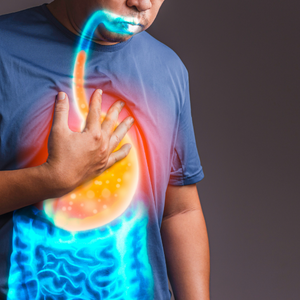GERD

Backflow of acid from the stomach into the esophagus or food pipe is called gastroesophageal reflux. At the junction of the esophagus and stomach, a thickened band of circular muscle known as lower esophageal sphincter (LES) acts as a one way valve, preventing acid reflux. Inadequate functioning of the LES results in acid reflux.
Other factors such as hiatal hernia, abnormal contractions of the esophagus as well as slow or poor emptying of the stomach can contribute to reflux as well. Acid reflux can damage the esophagus lining causing inflammation, ulceration, scarring/narrowing of the lumen (stricture) and rarely precancerous change in the lining of the esophagus called Barrett’s esophagus.
Symptoms
- Heartburn or chest pain.
- Regurgitation of sour liquid.
- Difficulty swallowing.
- Coughing and wheezing — especially while lying down at night.
Treatment
Treatment depends on extent of symptoms and involves lifestyle modifications and medications.
Lifestyle changes:
- Lose excess weight and eat smaller meals.
- Avoid foods that trigger heartburn. Fried or fatty foods, Chocolate, and Peppermint.
- Avoid alcohol and nicotine.
Medications
- Antacids, such as Tums.
- H-2-receptor blockers, such as cimetidine (Tagamet HB) or famotidine (Pepcid AC).
- Proton pump inhibitors:
- Omeprazole or Prilosec.
- Lansoprazole or Prevacid.
- Rabeprazole or Aciphex.
- Dexlansoprazole or Dexilant.
- Pantoprazole or Protonix.
FAQs
Gastroesophageal reflux disease (GERD) is a chronic condition characterized by the backflow of stomach (gastric) acid into the esophagus (the tube that carries food from your mouth to your stomach). This backflow is known as acid reflux.
GERD is caused by a malfunction of the lower esophageal sphincter (LES), a muscle that separates the esophagus and stomach. When the LES becomes weak or relaxes at the wrong time, stomach acid can flow back into the esophagus.
Symptoms of GERD can include heartburn, chest pain, regurgitation, difficulty swallowing, and a sour taste in the mouth.
GERD is typically diagnosed based on symptoms and the response to treatment. Your doctor may also perform tests such as an upper endoscopy, esophageal pH monitoring, and/or a barium swallow to confirm the diagnosis.
GERD can be treated with lifestyle changes such as avoiding foods that trigger symptoms, losing weight, and not eating close to bedtime. Medications such as antacids, H2 blockers, and proton pump inhibitors can also be used to reduce acid production and relieve symptoms.
The long-term prognosis for GERD is generally good with appropriate management. With a proper treatment plan and ongoing monitoring, most people with GERD are able to manage their symptoms and avoid complications.
In some cases, GERD can lead to complications such as esophagitis, Barrett’s esophagus, and even esophageal cancer. It is important to receive prompt treatment and ongoing monitoring to prevent complications.
Certain lifestyle changes, such as maintaining a healthy weight, avoiding foods that trigger symptoms, and not eating close to bedtime, may help to reduce the risk of developing GERD.
While GERD is a chronic condition, it can be managed with treatment and ongoing monitoring. With appropriate management, most people with GERD are able to control their symptoms and avoid complications.
There are several lifestyle changes that can help manage GERD:
- Eat smaller, more frequent meals instead of large meals.
- Avoid foods and drinks that trigger your symptoms, such as fatty or fried foods, spicy foods, citrus fruits, chocolate, caffeine, and alcohol.
- Avoid eating within a few hours of going to bed.
- Avoid smoking and try to reduce your stress levels.
In some cases, GERD can lead to long-term complications such as esophagitis, Barrett’s esophagus, and esophageal cancer. Regular monitoring with endoscopy is important to detect any complications early.
Certain foods and drinks, such as citrus fruits, tomatoes, caffeine, alcohol, and spicy foods, can trigger acid reflux and worsen symptoms of GERD. It is important to identify and avoid triggers for acid reflux.